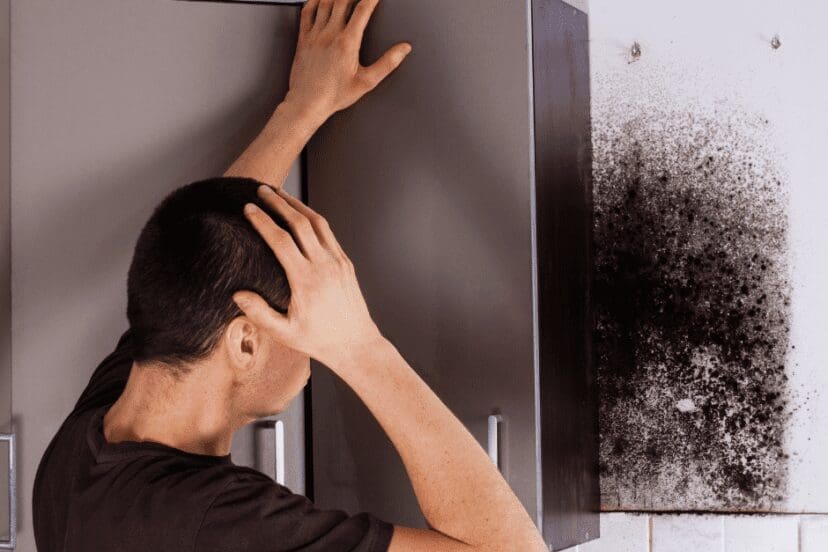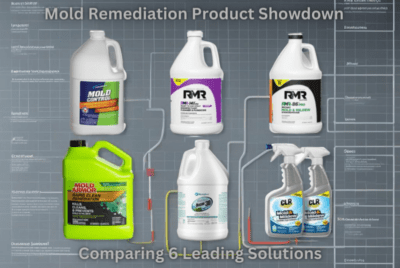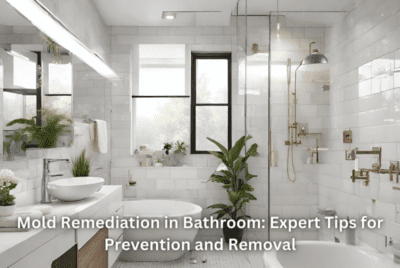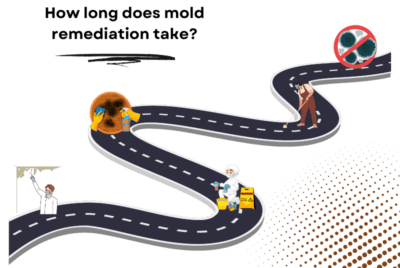Black Mold: Healths Risks, Identity, Prevention and Removal
In the quiet corners of our homes, a hidden menace often lurks, one that can silently jeopardize our well-being without us even realizing. I’m talking about black mold – that unwelcome intruder that thrives in dampness and darkness. As a seasoned expert in home safety, I’ve delved deep into the risks associated with this enigmatic growth, and I’m here to equip you with essential knowledge to combat it.
Invisible and potentially hazardous, black mold has earned its reputation as an unwelcome intruder that thrives in damp and humid environments. This comprehensive guide delves into the world of black mold, shedding light on its dangers, symptoms, prevention, and treatment. By the end of this article, you’ll be equipped with the knowledge to identify, mitigate, and eliminate the risks of black mold, ensuring a healthier living environment for you and your loved ones.
What is Black Mold?
Black mold, scientifically known as Stachybotrys chartarum, is a type of fungus that thrives in moisture-rich environments. It’s notorious for its dark appearance and its potential to cause health problems in individuals exposed to its spores.
Can Black Mold Make You Sick?
The short answer is yes. Black mold is known for producing mycotoxins, which are toxic substances that can be harmful when inhaled or touched. These mycotoxins can trigger a range of health issues, from mild allergic reactions to more severe respiratory problems.
How Harmful is Black Mold?
The harm caused by black mold depends on various factors, including the level of exposure, the individual’s sensitivity, and their overall health. While not everyone exposed to black mold will experience severe symptoms, it’s crucial to take its presence seriously.
How Quickly Can Black Mold Affect You?
The effects of black mold exposure can vary. In some cases, symptoms can appear shortly after exposure, while in others, they might take time to develop. It’s important to recognize any changes in health and environment, especially if you suspect the presence of black mold.
Who Does the Condition Affect?
Black mold doesn’t discriminate – it can affect anyone, regardless of age or health status. However, individuals with weakened immune systems, respiratory conditions, or allergies are more susceptible to the adverse effects of black mold exposure.
What Happens if You Breathe in Black Mold?
When you breathe in black mold spores, they can trigger allergic reactions and respiratory issues. The symptoms may range from sneezing, coughing, and irritated eyes to more severe reactions, particularly in individuals with pre-existing health conditions.
What are the Symptoms of Black Mold Exposure?
The symptoms of black mold exposure can vary widely, making it sometimes challenging to attribute them solely to mold. Common symptoms include nasal congestion, throat irritation, coughing, wheezing, skin rashes, and eye irritation. If you suspect mold exposure, paying attention to any recurring symptoms is crucial.
Does Black Mold Cause Acute Idiopathic Pulmonary Hemorrhage in Infants?
The link between black mold and acute idiopathic pulmonary hemorrhage (AIPH) in infants is a subject of ongoing research and debate. While some studies suggest a potential connection, a direct causal relationship has not been conclusively established.
What Causes Black Mold?
Black mold thrives in damp and humid environments. Leaky roofs, plumbing issues, poor ventilation, and flooding create the perfect conditions for its growth. The spores can spread quickly and settle on various surfaces, making it essential to address moisture problems promptly.
How Does Black Mold Spread?
Black mold spreads through its spores, which can become airborne and travel to different areas of your home. These spores are resilient and can survive in harsh conditions, making thorough removal and preventive measures crucial.
How is a Black Mold Allergy Diagnosed?
If you suspect a black mold allergy, consulting a healthcare provider is essential. They will evaluate your symptoms and medical history to determine if an allergy test is necessary.
What Tests Will be Done to Diagnose a Black Mold Allergy?
Allergy testing for black mold typically involves skin prick tests or blood tests. Skin prick tests expose your skin to small amounts of allergens, including black mold, to observe any allergic reactions. Blood tests measure the levels of specific antibodies in your blood that indicate an allergic response.
How is a Black Mold Allergy Treated?
The primary treatment for a black mold allergy is to minimize exposure. Your healthcare provider may recommend allergy medications to alleviate symptoms. Additionally, addressing the source of mold in your environment is crucial to prevent future exposure.
Do Air Purifiers Help with Black Mold?
Air purifiers with HEPA filters can help improve indoor air quality by capturing mold spores and other allergens. However, air purifiers should be used in conjunction with other preventive measures, such as maintaining a dry environment and addressing leaks promptly.
What Kills Black Mold Instantly?
Household cleaning solutions like vinegar, hydrogen peroxide, and commercial mold removers can be effective in killing black mold on surfaces. However, it’s important to follow safety precautions and use proper protective gear when dealing with mold removal.
How Do You Detox from Black Mold Exposure?
There is limited scientific evidence to support the concept of “mold detox.” If you’re concerned about black mold exposure, the best course of action is to consult a healthcare provider, address any health symptoms, and ensure your living environment is mold-free.
How Can I Reduce My Risk of Developing a Black Mold Allergy?
Reducing your risk of developing a black mold allergy involves keeping your living spaces dry and well-ventilated. Fix leaks promptly, maintain humidity levels below 50%, and address any signs of mold growth immediately. Regular cleaning and maintenance are key to preventing mold infestations.
When Should I See a Healthcare Provider?
If you experience persistent respiratory symptoms, allergies, or unexplained health issues that could be attributed to mold exposure, it’s advisable to consult a healthcare provider. They can help diagnose any potential health problems and recommend appropriate treatments.
What Questions Should I Ask a Healthcare Provider?
When consulting a healthcare provider regarding potential mold exposure, consider asking questions like:
- Could my symptoms be related to mold exposure?
- Should I undergo allergy testing for mold?
- What are the best ways to manage and prevent mold allergies?
- Are there specific measures I should take at home to reduce mold exposure?
Frequently Asked Questions
1. Is black mold toxic? While black mold does produce mycotoxins, not all types are toxic. However, any mold growth indoors should be treated seriously and addressed promptly.
2. Can I remove black mold myself? Small-scale mold removal can be done by homeowners. However, extensive growth and severe infestations should be handled by professionals to ensure safety and thorough removal.
3. Can I prevent black mold growth entirely? While it’s challenging to eliminate all mold spores, you can take measures to minimize mold growth by maintaining a dry environment, fixing leaks, and improving ventilation.
4. Are there natural remedies for black mold? Some household items like vinegar, baking soda, and hydrogen peroxide can help with mold removal on surfaces. However, professional remediation might be necessary for extensive infestations.
5. What’s the difference between mold and mildew? Mold and mildew are both types of fungi, but they have distinct characteristics. Mildew is typically white or gray and grows on the surface, while mold can be various colors and penetrates deeper.
6. Are red mold and black mold the same? No, red mold and black mold are distinct types of mold, each possessing its own unique characteristics and potential health risks. It is crucial to address any mold infestation, regardless of its color, in order to safeguard both your health and property.
Conclusion
Understanding the risks associated with black mold is essential for safeguarding your health and well-being. From identifying the symptoms of exposure to taking preventive measures, you now possess the knowledge to mitigate the dangers of black mold. Remember that a dry and well-ventilated environment is your strongest defense against mold growth. By staying informed and proactive, you can create a healthier living space for you and your family.




